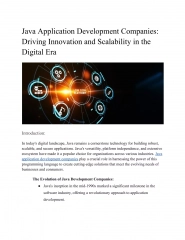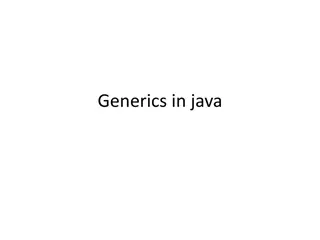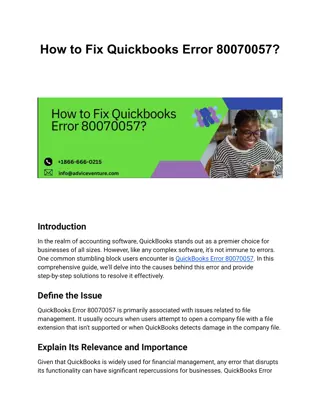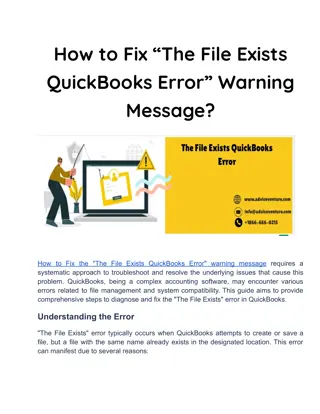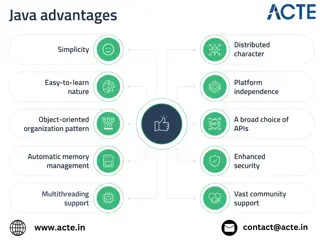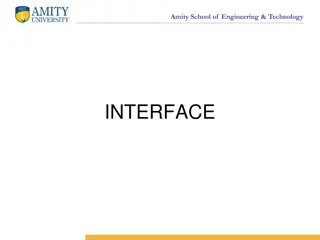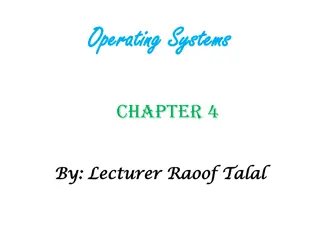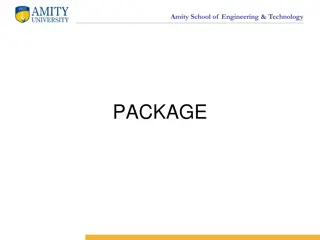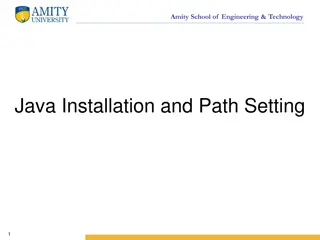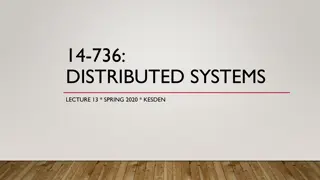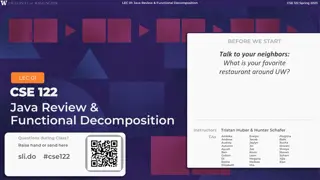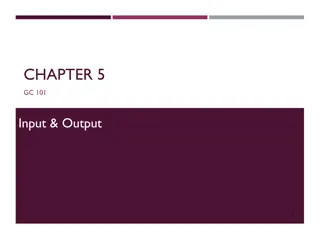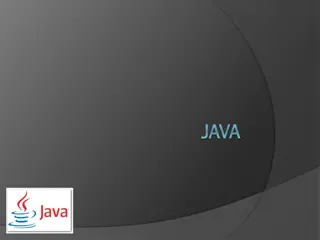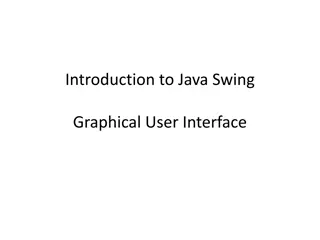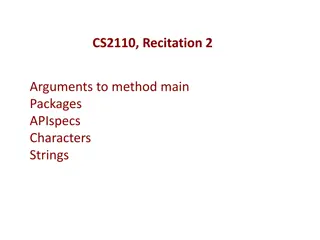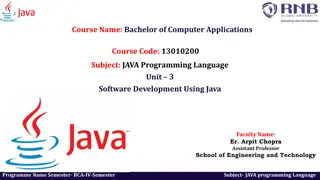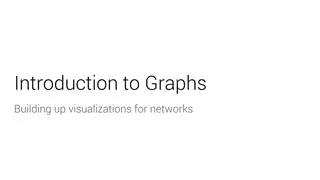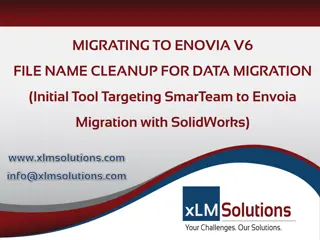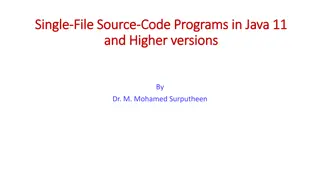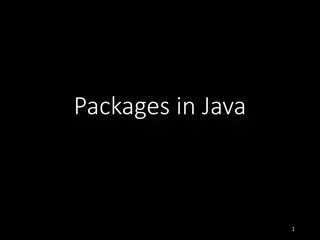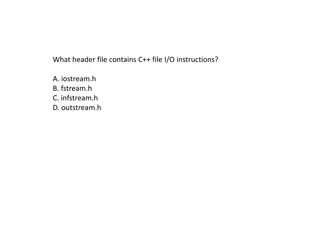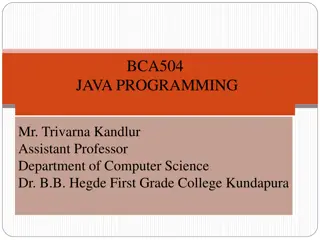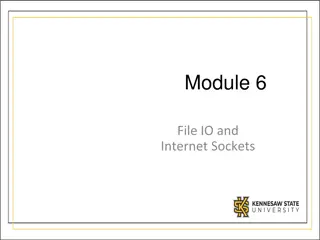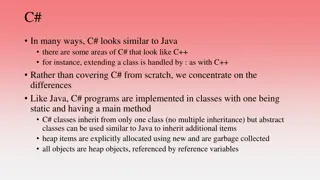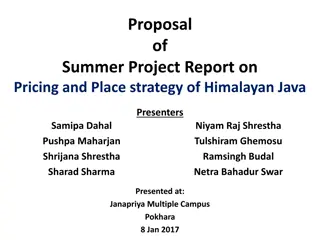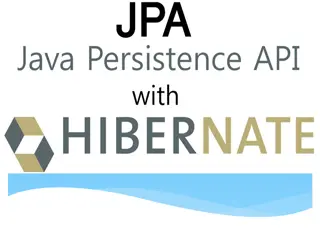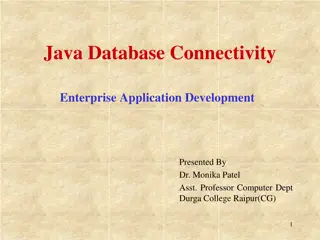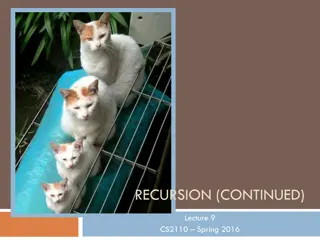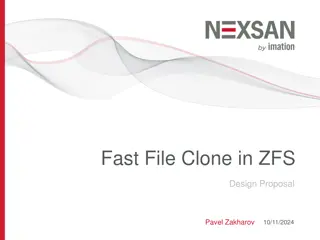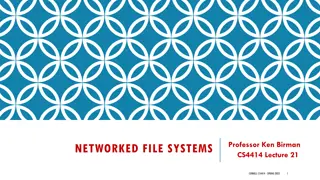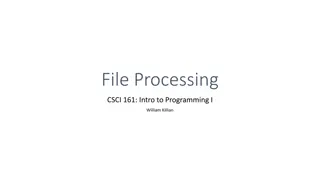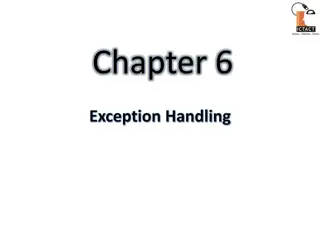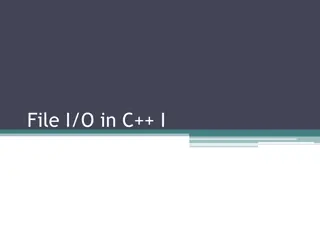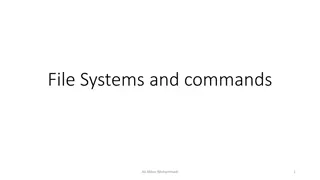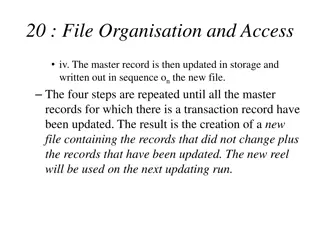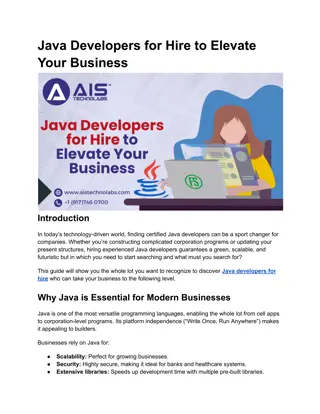Java application development company (1)
In today's digital landscape, Java remains a cornerstone technology for building robust, scalable, and secure applications. Java's versatility, platform independence, and extensive ecosystem have made it a popular choice for organizations across various industries. Java application development compa
2 views • 4 slides
Generics in Java
Generics in Java allow for parameterized types, enabling the use of different data types in classes, interfaces, and methods. By creating generic entities, such as classes that work with various data types, Java programmers can write more flexible and reusable code. This concept is demonstrated thro
1 views • 16 slides
How to Fix Quickbooks Error 80070057?
How to Fix Quickbooks Error 80070057?\nQuickBooks Error 80070057 can disrupt financial management. It occurs due to file extension issues or data damage. Symptoms include inability to open files and error code display. Causes involve incorrect file extensions or firewall settings. Diagnostic tools l
1 views • 5 slides
How to Fix “The File Exists QuickBooks Error” Warning Message
How to Fix the \"The File Exists QuickBooks Error\" warning message requires a systematic approach to troubleshoot and resolve the underlying issues that cause this problem. QuickBooks, being a complex accounting software, may encounter various errors related to file management and system compatibil
0 views • 5 slides
Understanding Java: The Backbone of Cross-Platform Development
Java stands as a cornerstone in the realm of programming languages, revered for its versatility and robustness. Enrolling in a Java Course in Pune significantly enhances one\u2019s ability to leverage Java\u2019s capabilities effectively. Understandi
1 views • 1 slides
Java Interfaces in Amity School of Engineering & Technology
Java interfaces are a key concept in object-oriented programming that allows for achieving multiple inheritance. The article discusses how Java interfaces work, their role in defining class behavior, and the differences between interfaces and classes. It also explains the syntax for declaring interf
4 views • 48 slides
Implementation of File System in Operating Systems
Various structures, such as boot control blocks and directory implementations, play a crucial role in implementing a file system in operating systems. These structures help in managing disk and in-memory data efficiently, ensuring effective file storage and retrieval. Linear lists and hash tables ar
1 views • 22 slides
Java Packages and Their Importance in Programming
An exploration of Java packages, their role in structuring code, organizing classes, and enhancing code reusability. Learn about built-in and user-defined packages, the Java API's package organization, and the different types of packages available in Java programming. Discover how packages help in c
2 views • 18 slides
Amity School of Engineering & Technology Java Installation Guide
In this detailed guide provided by Amity School of Engineering & Technology, learn how to install and set up Java on your system effectively. The step-by-step instructions cover downloading the Java installer, configuring the installation wizard, setting environmental variables, and more to ensure a
1 views • 19 slides
Distributed File Systems
A distributed file system manages files across multiple machines on a network, providing users with a seamless experience as if they were using a local file system. This system abstracts details such as file locations, replicas, and system failures from the user, ensuring efficient and reliable file
0 views • 35 slides
Java Review & Functional Decomposition in CSE 122 Spring 2023
Lecture 01 in CSE 122 covers Java review, functional decomposition, and code quality. Announcements include a Java review session, programming assignments, and reminders on Java syntax. The session encourages active participation through in-class activities using Slido polls. Students are also urged
0 views • 24 slides
Interactive Programs and Input/Output in Java
Interactive programs in Java allow users to input data through the console, which can be captured and used in the program. This involves using the Scanner class to read user input, and understanding common Scanner methods to process different types of input. Importing Java class libraries is essenti
2 views • 15 slides
Learning Swing with Java Foundation Classes (JFC) and Swing
Java Foundation Classes (JFC) and Swing provide a powerful set of tools for building graphical user interfaces in Java applications. This includes Swing GUI components, pluggable look-and-feel support, accessibility APIs, Java 2D graphics, and internationalization capabilities. By learning Swing wit
1 views • 11 slides
Java Swing for Building Graphical User Interfaces
Java Swing is a powerful framework for creating graphical user interface applications in Java. It provides a wide array of visual components such as JFrame, JComponent, and JPanel, enabling developers to build interactive and visually appealing applications easily. With Swing, developers can design
1 views • 25 slides
Java Application Development Basics
Learn how to create a Java application with a main method using Eclipse. Understand the concept of method parameters and how to provide arguments when running the application through Eclipse's Run Configurations feature. Explore the structure of packages in Java and the Java API.
0 views • 26 slides
Java Programming: BCA IV Semester Course Overview
This Bachelor of Computer Applications (BCA) course focuses on Java programming language fundamentals, object-oriented concepts, software development principles, and practical application skills. Students will learn to define Java program features, implement object-oriented features, work with array
0 views • 31 slides
Graphs: Visualizations and Representations in Java
Delve into the world of graphs with a focus on visualizations for networks and building up graph representations in Java. Explore different graph representations, adjacency lists, and key-value mappings, along with insights on storing and tracking data efficiently using Java data structures. Dive in
0 views • 12 slides
ENOVIA V6 File Name Cleanup for Data Migration
Problematic file names with unsupported characters can hinder data migration into ENOVIA V6, impacting object busname, titles, and filenames. This article proposes a solution involving filename changes, database updates, and file vault maintenance. The methodology includes SQL queries for analysis,
0 views • 5 slides
Single-File Source Code Programs in Java 11
Explore the concept of single-file source code programs in Java 11, where the entire program is contained within a single .java file without external dependencies. Learn how to compile and run these programs both before and after Java 11, and discover the new feature of executing Java programs direc
0 views • 11 slides
Scanner Class in Java: Reading User Input and Processing Files
The Scanner class in Java's java.util package allows reading input from the keyboard or files. It looks for tokens in the input, reads different types of values, and has methods like nextInt() and nextLine(). You can also read from files by creating a File object. Learn how to use Scanner to interac
0 views • 21 slides
Packages in Java: A Comprehensive Overview
Packages in Java play a crucial role in organizing and structuring code for efficient reuse and maintenance. They allow you to group related classes together, provide encapsulation, and facilitate code organization. This article dives into the basics of Java packages, advantages they offer, differen
0 views • 19 slides
C++ File I/O Operations
Learn about C++ file I/O operations, including input/output instructions, file handling with ifstream and ofstream, opening multiple files, checking end of file, and a review of the file I/O process. Discover how to write to an ASCII file and read data from it in C++ programming. Practice with examp
0 views • 47 slides
Introduction to Java Programming: Basics and Applications
Java, developed by James Gosling, is a versatile object-oriented programming language used for mobile, desktop, web applications, servers, games, and more. It is renowned for its platform independence, popularity, ease of use, security, and strong community support. This subject delves into Java fun
0 views • 15 slides
File Input/Output in Java
Learn about file input/output operations in Java. Explore how to read and write data to files, handle exceptions using try/catch, work with streams, understand the process of file handling, and examine file structure examples like storing airline data. Enhance your Java programming skills by masteri
0 views • 41 slides
Java Overview and Basics: Understanding the Fundamentals of Java Programming
Java is a versatile programming language known for its simplicity, security, portability, and high performance. Its history dates back to 1990 when the concept was first suggested, leading to the creation of Java in 1995 by James Gosling. Over the years, Java has evolved with various versions introd
1 views • 65 slides
Overview of Java Programming Language
Java is a versatile and powerful programming language created by James Gosling and others at Sun Microsystems in the 1990s. It aims for portability, reliability, safety, simplicity, and efficiency. With a strong focus on object-oriented programming, Java has evolved over the years with a rich histor
0 views • 33 slides
Mastering Generics in Effective Java: A Practical Guide for Java Programmers
Explore the world of generics in Java through Joshua Bloch's guidance in "Effective Java". Learn the importance of avoiding raw types, leveraging parameterized types for type safety, handling mixing of generic and raw types, and implementing wildcards for flexible and typesafe coding. Enhance your J
0 views • 30 slides
Differences Between C# and Java: A Comparative Overview
C# and Java share similarities in syntax and features, but there are key distinctions that set them apart. From class inheritance to memory management, this comparison highlights the unique aspects of C# programming. Explore how C# diverges from Java in terms of multiple inheritance, explicit heap a
0 views • 16 slides
Study on Pricing and Place Strategy of Himalayan Java Coffee: A Detailed Analysis
This report delves into the pricing and place strategies of Himalayan Java coffee, focusing on factors influencing coffee pricing and selection of outlet locations. The study aims to identify the target market, understand competitive dynamics, and analyze factors impacting coffee sales at Himalayan
0 views • 10 slides
Java Persistence API (JPA) for Data Management in Java Applications
Java Persistence API (JPA) is a specification that provides a framework for managing relational data in Java applications. It simplifies ORM solutions, offers vendor independence, and supports test-driven development with annotation-driven mapping.
0 views • 31 slides
Introduction to Java Database Connectivity (JDBC) in Enterprise Application Development
JDBC, or Java Database Connectivity, is a vital technology in enterprise application development that provides a standardized library for Java programs to connect to databases via SQL commands. It abstracts vendor-specific details, making connectivity to multiple databases seamless. JDBC API standar
1 views • 13 slides
Recursion in Java: CS2110 Lecture Overview
This content delves into the concept of recursion in the context of Java programming as discussed in the CS2110 Spring 2016 lecture series. It covers the basics of recursion, including base cases and how Java stack frames operate. The material also includes solutions to exception-handling problems a
0 views • 21 slides
Fast File Clone in ZFS Design Proposal Overview
This document details a proposal for implementing fast file clone functionality in ZFS, allowing for nearly instant file copying through referencing. The motivation behind this proposal includes support for VMware VAAI, NAS Full File Clone, and Fast File Clone to save memory and disk space. The prop
0 views • 29 slides
Evolution of Networked File Systems in Computer Science
The evolution of networked file systems in the computer science field has been pivotal in enabling remote file storage, distributed coordination, and improved system stability. Starting from Bill Joy's innovations in the BSD version of Unix to the introduction of NFS by Sun Microsystems, the concept
0 views • 55 slides
File Processing and Input/Output Operations in Java
Gain insights into file processing and I/O operations in Java programming, covering topics such as file handling, reading files, file paths, compiler errors, exceptions, and the 'throws' clause. Learn how to work with files, handle errors effectively, and optimize your code for efficient file manage
0 views • 41 slides
Exception Handling in Java: Understanding Errors and Exceptions
Exception handling in Java is crucial for dealing with errors and exceptions that can occur during program execution. Errors and exceptions are conditions that disrupt the normal flow of a program, and understanding their differences is key to effective error management. This chapter covers the conc
0 views • 32 slides
File Input/Output (I/O) in C++
File Input/Output (I/O) is an essential concept in C++ programming, allowing for interaction with files stored on secondary storage devices. This involves steps like including the fstream header file, declaring file stream variables, associating them with input/output sources, opening the file, perf
0 views • 19 slides
File Systems: File Naming, Extensions, and Structure
File systems and commands play a crucial role in managing information on disks while shielding users from the complexities of storage mechanisms. This article delves into the rules of file naming, distinctions between upper and lower case letters, file extensions indicating file types, and the under
0 views • 85 slides
Sequential File Maintenance and Organisation Process
In sequential file maintenance, the master records are updated and written to a new file in sequence after processing transaction records. This process continues until all relevant master records are updated, resulting in a new file with unchanged and updated records. Additional steps involve file s
0 views • 7 slides
Java Developers for Hire to Elevate Your Business
Elevate your business with top-notch Java developers for hire. Hire dedicated Java developers, programmers, and teams in India for custom solutions today.\n\nSource>>\/\/ \/hire-java-developers\n
0 views • 4 slides
